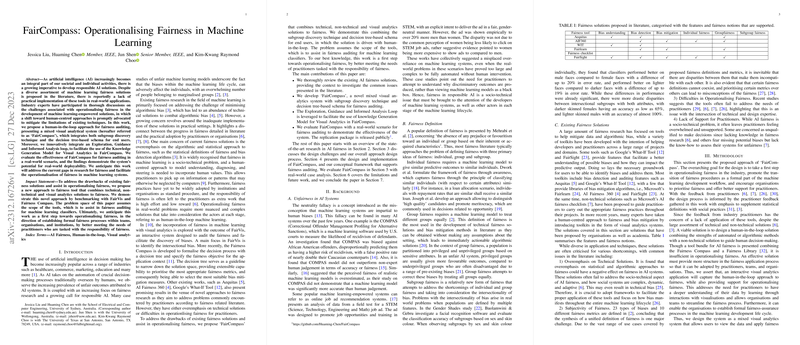Introduction to FairCompass
In the ever-growing field of AI, fairness in ML has become a pressing concern. With AI's integration into society, unfair ML models have been shown to negatively impact individuals, especially those from marginalized groups. There is a strong focus on minimizing algorithmic bias; however, the practical adoption of fairness solutions is lagging behind. Effective implementation of these solutions is hindered by a lack of tools for real-world applications, leading researchers to advocate for a shift towards human-centered approaches to enhance existing techniques.
A Human-in-the-Loop Approach for Fairness
A novel human-in-the-loop approach named FairCompass offers a step towards addressing fairness in ML systems. It combines subgroup discovery techniques with decision-tree based guidance for end users, aiming to streamline the fairness auditing process. This approach integrates an Exploration, Guidance, and Informed Analysis loop to enhance the deployment of fairness auditing tools in real-world settings. Moreover, FairCompass innovatively includes a visual analytics system that helps users better understand and manipulate fairness metrics relevant to their data.
Operationalizing Fairness in Practice
The development of FairCompass involves a comprehensive review of existing AI fairness tools to identify common issues. By combining technical, non-technical, and visual analytics solutions, FairCompass moves towards operationalizing fairness in ML. This is shown through benchmarking against existing tools and demonstrating a new approach that meets the practical needs of ML practitioners concerning fairness. The new system emphasizes a human-centric design and is designed without assumptions about users' expertise in ML fairness.
Evaluation and Future Directions
FairCompass has been evaluated using a real-world scenario for fairness auditing, showcasing its potential for deployability and effectiveness. The system is open to the public for further research and use. However, the development of FairCompass also illuminates limitations, including the need for more comprehensive guidance to cover the complex fairness research landscape, awareness of human biases in human-in-the-loop systems, adjustments for domain-specific issues, and the need for higher-level organizational enforcement of fairness practices.
As we move towards more responsible AI practices, incorporating methods for operationalizing fairness such as those offered by FairCompass can assist organizations in navigating the challenges of fairness in decision-making powered by machine learning.
